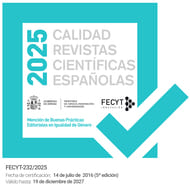MCERL y vocabulario receptivo de estudiantes españoles de Francés como Lengua Extranjera
Resumen
En el marco de las investigaciones que relacionan el vocabulario receptivo de aprendices de lenguas con la competencia general en lenguas, presentamos los resultados de una investigación desarrollada con estudiantes de francés de una Escuela Oficial de Idiomas, con el doble objetivo de determinar el tamaño de su vocabulario receptivo y establecer una correspondencia con los diferentes niveles del Marco Común Europeo de Referencia para las Lenguas (MCERL). Del análisis realizado, concluimos que el vocabulario es un indicador del nivel de competencia, y que la obtención de un determinado nivel está en dependencia del tamaño de vocabulario.
Citas
ADOLPHS, Svenja & Norbert SCHMITT (2004): «Vocabulary coverage according to spoken discourse context», in Paul Bogaards y Batia Laufer (ed.), Vocabulary in a second language. Amsterdan, John Benjamins, 39-49.
AGUSTÍN, María Pilar & Andrés CANGA (2016): «Vocabulary growth in young CLIL and traditional EFL learners: evidence from research and implications for education». International Journal of Applied Linguistics, 26:2, 211-227.
AGUSTÍN, María Pilar & Melania TERRAZAS (2009): «Examining the relationship be-tween receptive vocabulary size and written skills of primary school learners». At-lantis, 31:1, 129-147.
AGUSTÍN, María Pilar & Melania TERRAZAS (2012): «Vocabulary knowledge develop-ment and gender differences in a second language». ELIA: Estudios de Lingüística inglesa aplicada, 12, 45-75.
ALDERSON, J. Charles (2005): Diagnosing foreign language proficiency: The interface between learning and assessment. Londres, Continuum.
ARNAUD, Pierre & Henri BÉJOINT [ed.] (1992): Vocabulary and applied linguistics. Basingstoke, Macmillan.
BATISTA, Roselene & Marlise HORST (2016): «A New Receptive Vocabulary Size Test for French». The Canadian Modern Language Review/La Revue canadienne des langues vivantes, 72(2), 211-233.
BAUDOT, Jean (1992): Fréquences d'utilisation des mots en français écrit contemporain. Montreal, Les Presses de l'Université de Montréal.
BLAIS, Isabelle (2014): La taille du vocabulaire et les habiletés réceptives des étudiants adultes de niveau 6 en Francisation. Tesis de maestría, Universidad de Quebec, Montreal. URL: http://www.archipel.uqam.ca/6673/1/M13471.pdf.
BOGAARDS, Paul (1994): Le vocabulaire dans l'apprentissage des langues étrangères. Paris, Didier.
BOGAARDS, Paul & Batia LAUFER [ed.] (2004): Vocabulary in a second language. Amsterdan, John Benjamins B.V.
CALAQUE, Élizabeth & Jacques DAVID [ed.] (2004): Didactique du lexique. Contextes, démarches, supports. Bruselas, De Boeck Université.
CANGA, Andrés & Almudena FERNÁNDEZ (2014): «Motivation and L2 receptive vocabu-lary knowledge of Spanish EFL learners at the Official School of Languages». Mis-celánea: a Journal of English and American Studies, 49, 13-28.
CLARK, Eve (1993): The lexicon in acquisition. Cambridge, Cambridge University Press.
COADY, James & Thomas HUCKIN [ed.] (1997): Second language vocabulary acquisition. Cambridge, Cambridge University Press.
COBB, Tom & Marlise HORST (2004): «Is there room for an academic word list in French?», in Paul Bogaards y Batia Laufer (eds.), Vocabulary in a second language: selection, acquisition and testing. Amsterdan, John Benjamins, 15-38.
CONSEJO DE EUROPA (2002): Marco común europeo de referencia para las lenguas: aprendizaje, enseñanza, evaluación. Madrid, MECD y Anaya.
COXHEAD, Averil (2000): «A new academic word list». TESOL Quarterly, 34:2, 213-238.
DALLER, Helmut; James MILTON & Jeanine TREFFERS-DALLER [ed.] (2007): Modelling and assessing vocabulary knowledge. Cambridge, Cambridge University Press.
DAVID, Anabelle (2008): «Vocabulary breadth in French L2 learners». The Language Learning Journal, 36:2, 167-180.
DE LA MAYA RETAMAR, Guadalupe (2015): El desarrollo de la competencia léxica en la adquisición del francés como lengua extranjera en la ESO. Tesis doctoral dirigida por Rafael Alejo González y María Rosa Luengo González. Badajoz, Universidad de Extremadura. URL: http://dehesa.unex.es/handle/10662/4045?locale-attribute=pt.
DE LA MAYA RETAMAR, Guadalupe & Inmaculada MORA RAMOS (2019): «Estudio del conocimiento léxico en FLE de estudiantes españoles de Secundaria». Revista Complutense de Educación, 30:2, 527-543.
EYCKMANS, June (2004): Measuring receptive vocabulary size. Utrecht, LOT.
FAN, May (2000): «How big is the gap and how to narrow it? An investigation into the active and passive vocabulary knowledge of L2 learners». RELC Journal, 31:2, 105-119.
FERNÁNDEZ, Almudena (2017): « Individual and contextual variables in EFL receptive vocabulary: analysis of gender effect and motivation of CLIL primary graders». Odisea. Revista de estudios ingleses, 15, 57-72.
GALISSON, Robert (1971): Inventaire thématique et syntagmatique du français fondamental. París, Hachette.
GRAHAM, Suzanne; Brian RICHARDS & David MALVERN (2008): «Progress in learning French vocabulary in a one-year advanced course at school». Journal of French Language Studies, 18:3, 349-364.
GREIDANUS, Tine. & Lydius NIENHUIS (2001): «Testing the quality of word knowledge in a second language by means of words associations. Types of distractors and types of associations». The Modern Language Journal, 85:4, 567-577.
GREIDANUS, Tine; Bianca BEKS & Richards WAKELY (2006): «Testing the development of French word knowledge by advanced Dutch-and English-speaking learners and native speakers». The Canadian Modern Language Review/La Revue cana-dienne des langues vivantes, 62:4, 509-532.
GROSSMANN, Francis; Anne-Marie PAVEAU & Gérard PETIT [ed.] (2005): Didactique du lexique: langue, cognition et discours. Grenoble, ELLUG.
GYLLSTAD, Henrik (2013): «Looking at L2 vocabulary knowledge dimensions from an assessment perspective –challenges and potential solutions», in Camilla Bardell, Christina Lindqvist & Batia Laufer (ed.), L2 vocabulary acquisition, knowledge and use: new perspectives on assessment and corpus analysis. Amsterdan, EUROSLA, 11-28.
HILTON, Heather (2007): «La compétence lexicale en production orale», in Actes du col-loque DILTEC, recherches en acquisition et en didactique des langues étrangères et se-condes. París, Université Sorbonne Nouvelle - Paris 3, 1-10.
HARKIO, Noora & Päivi P. PIETILÄ (2016): «The role of vocabulary breadth and depth in reading comprenhension: a quantitative study of Finnish EFL learners». Journal of Language teaching and research, 7:6, 1079-1088.
JIMÉNEZ, Rosa María [ed.] (2010): Gender perspectives on vocabulary in foreign and second languages. Basingstoke, Palgrave Macmillan.
JIMÉNEZ, Rosa María [ed.] (2014): Lexical availability in English and Spanish as second language. Dordrecht, Springer.
JIMÉNEZ, Rosa María & Andrés CANGA (2019): «El léxico disponible en inglés de chicos y chicas españoles adolescentes». ELIA: Estudios de Lingüística inglesa aplicada, 19, 157-176.
JIMÉNEZ, Rosa María & Soraya MORENO (2004-2005): «Promoting English vocabulary research in primary and secondary education: Test review and test selection crite-ria». ES. Revista de Filología inglesa, 25, 171-187.
JIMÉNEZ, Rosa María & Melania TERRAZAS (2005-2008): «The receptive vocabulary of English foreign language young learners». Journal of English Studies, 5-6, 173-191.
LAUFER, Batia (1989): «What percentage of text-lexis is essential for comprehension?», in Christer Laurén y Marianne Nordman (ed.), Special Language: from humans thin-king to thinking machines. Clevedon, Multilingual Matters, 316-323.
LAUFER, Batia (1992): «How much lexis is necessary for reading comprehension? », in Pierre J.L. Arnaud y Henri Béjoint (ed.), Vocabulary and applied linguistics. Lon-dres, Macmillan, 126-132.
LAUFER, Batia & Geke C. RAVENHORST-KALOVSKI (2010): «Lexical threshold revisited: Lexical text coverage, learners’ vocabulary size and reading comprehension». Reading in a Foreign Language, 22:1, 15-30.
LAUFER, Batia; Cathie ELDER; Kathryn HILL & Peter CONGDON (2004): «Size and strength: do we need both to measure vocabulary knowledge?». Language Testing, 21:2, 202-226.
LINDQVIST, Christina; Camilla BARDEL & Anna GUDMUNDSON (2011): «Lexical rich-ness in the advanced learner’s oral production of French and Italian L2». Iral, 49, 221-240.
MEARA, Paul (1990): «A note on passive vocabulary». Second Language Research, 6:2, 150-154.
MEARA, Paul (1996): «The dimensions of lexical competence», in Gillian Brown, Kirsten Malmkjaer & John Williams (ed.), Performance and competence in second language acquisition. Cambridge, Cambridge University Press, 35-53.
MEARA, Paul & James MILTON (2003): X_Lex. The Swansea levels test. Newbury, Ex-press.
MEARA, Paul (2009): Connected words: word association and second language vocabulary acquisition. Amsterdan, John Benjamins.
MELKA, Francine (1997): «Receptive vs. productive aspects of vocabulary», in Norbert Schmitt y Michael McCarthy (ed.), Vocabulary description, acquisition and peda-gogy. Cambridge, Cambridge University Press, 84-102.
MILTON, James (2004): «Testing yours students vocabulary size and what this can tell you», in ANUPI: Second International Congress Towards greater professionaliza-tion in language teaching. México, ANUPI. URL: http://www.anupi.org.mx/PDF/04007¬_JamesMilton.pdf
MILTON, James (2006): «Language lite? Learning French vocabulary in school». French Language Studies, 16, 187-205.
MILTON, James (2008): «French vocabulary breadth among learners in the British school and university system: comparing knowledge over time». Journal of French Lan-guage Studies, 18:3, 333-348.
MILTON, James (2010): «The development of vocabulary breadth across the CEFR lev-els», in Inge Bartning; Maisa Martin y Ineke Vedder (ed.), Communicative profi-ciency and linguistic development: intersections between SLA and language testing re-search. EUROSLA, 211-232.
MILTON, James (2013): «Measuring the contribution of vocabulary knowledge to profi-ciency in the four skills», in Camille Bardel; Christina Lindqvist & Batia Laufer (ed.), L2 vocabulary acquisition, knowledge and use. EUROSLA, 57-78.
MILTON, James & Thomai ALEXIOU (2009): «Vocabulary size and the common europe-an framework of reference for languages», in Brian Richards, Hellmut M. Daller, David Malvern, Paul Meara, James Milton & Jeanine Treffers-Daller (ed.), Vo-cabulary studies in first and second language acquisition. Basingstoke, Palgrave, 194-211.
MILTON, James; Jo WADE & Nikola HOPKINS (2010): «Aural word recognition and oral competence in a foreign language», in Rubén Chacón Beltrán, Christian Abelló Contesse & M. Mar Torreblanca López (ed.), Insigths into non-native vocabulary teaching and learning. Bristol, Multilingual Matters, 83-98.
MOCHIDA, Kira & Michael HARRINGTON (2006): «The Yes/No test as a measure of receptive vocabulary knowledge». Language Testing, 23:1, 73-98.
MORA RAMOS, Inmaculada (2014): Análisis del tamaño de vocabulario receptivo en alum-nos AICLE y no AICLE de 6º de Primaria. Trabajo Fin de Máster inédito. Badajoz, Universidad de Extremadura.
NASIR, Nur Fatima; Nor Ashikin MANAN & Noraziah AZIZAN (2017): «Examining the relationship between vocabulary knowledge and general English language profi-ciency». ESTEEM Journal of Social Sciences and Humanities, 1, 15-22.
NATION, Paul (1990): Teaching and learning vocabulary. Nueva York, Newbury House Publishers.
NATION, Paul (2001): Learning vocabulary in another language. Cambridge, Cambridge University Press.
NATION, Paul (2006): «How large a vocabulary is needed for reading and listening?». The Canadian Modern Language Review, 63:1, 59-82.
NATION, Paul (2016): Making and using word list for language learning and testing. Am-sterdan, John Benjamin.
ÖZTÜRK, Meral (2003): «Lexical competence in the Common European Framework of Reference for Languages», ponencia presentada en el I International Symposium on the Common European Framework and foreign language education in Turkey. Bursa. URL: https://docsbay.net/lexical-competence-in-the-common-european-framework-of-reference-for-languages.
OVTCHAROV, Valentin; Tom COBB & Randall HALTER (2006): «La richesse lexicale des productions orales: mesure fiable du niveau de compétence langagière». The Ca-nadian Modern Language Review, 63(1), 107-125.
QIAN, David D. (2002): «Investigating the relationship between vocabulary knowledge and academic reading performance: an assessment perspective». Language Learn-ing, 52(3), 513-536.
READ, John (2000): Assessing vocabulary. Cambridge, Cambridge University Press.
RICHARDS, Brian James; David MALVERN & Suzanne GRAHAM (2008): «Word frequen-cy and trends in the development of French vocabulary in lower-intermediate students during year 12 in English schools». The Language Learning Journal, 36:2, 192-213.
SCHMITT, Norbert (2010): Researching vocabulary: a vocabulary research manual. Houndmills, Palgrave Macmillan.
STAEHR, Lars Stenius (2008): «Vocabulary size and the skills of listening, reading and writing». The Language Learning Journal, 36:2, 139-152.
TERRAZAS, Melania & María Pilar AGUSTÍN (2009): «Exploring the increase of receptive vocabulary knowledge in the foreign language: a longitudinal study». Interna-tional Journal of English Studies, 9:1, 113-133.
TIBDALL, Françoise & Jeanine, TREFFERS-DALLER (2008): Analysing lexical richness in French learner language: what frecuency list and teacher judgements can tell us about basic and advanced words. Journal of French Language Studies, 18 :3, 299-313.
TREVILLE, Marie Claude (2000): Vocabulaire et apprentissage d'une langue seconde. Ou-tremont (Québec), Les Éditions Logiques.
TREVILLE, Marie Claude & Lise DUQUETTE (1996): Enseigner le vocabulaire en classe de langue. París, Hachette.
WEBB, Stuart Alexander & Anna CHANG (2012): «Second language vocabulary growth». RELC Journal, 43:1, 113-126.
ZAREVA, Alla; Paula SCHWANENFLUGEL & Yordanka NIKOLOVA (2005): «Relation-ship between lexical competence and language profiency. Variable sensitivi-ty». Studies in Second Language Acquisition, 27, 567-595.










